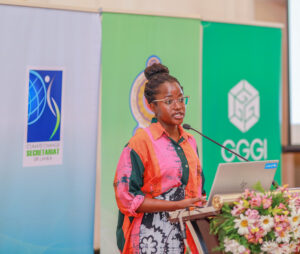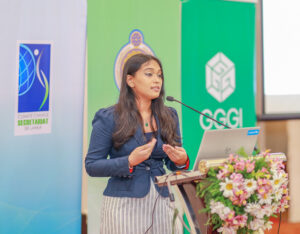COLOMBO, SRI LANKA, MARCH 14, 2024– In line with the International Women’s Day 2024 theme on inspiring inclusion, the Ministry of Environment Climate Change Secretariat and the Global Green Growth Institute (GGGI) held a Stakeholder Consultation Workshop on the development of a Gender and Social Action Plan linked to national adaptation planning. This is part of the process for the revision of Sri Lanka’s National Adaptation Plan (NAP) of 2016-2025 which is being undertaken by the NAP Readiness Support Project being funded through the Green Climate Fund (GCF). GGGI is the delivery partner for this project, working closely with the Ministry of Environment’s Climate Change Secretariat.
Climate Action is an opportunity for achieving sustainable economic growth and socially inclusive prosperity for Sri Lanka. However, climate change impacts exacerbate existing inequalities already experienced by vulnerable groups. Attended by 45 participants, representing national and local government, civil society, development partners, private sector, academic and research institutions the aim of the consultation workshop was to receive inputs from stakeholders working on vulnerability, gender and social inclusion-related interventions in the context of climate change in Sri Lanka, to inform the Gender and Social Action Plan.
Dr. Sonali Senaratna Sellamuttu, GGGI Country Representative Sri Lanka and Team Lead for the Project emphasized the importance of Gender and Social Action Plan in providing the basis for mainstreaming gender and social inclusion at both the national as well as the provincial level adaptation planning processes. “Under the GCF NAP Readiness Support project, we hope to adopt a gender and social inclusion lens across all our project activities, across the different vulnerable sectors that we are covering and at the provincial level, taking these aspects into consideration during capacity building and institutional strengthening as well”.
Mr. Leel Randeni, Director (Climate Change), Climate Change Secretariat in his opening remarks at the workshop stated, “Gender and social inclusion was not incorporated into the first iteration of Sri Lanka’s National Adaptation Plan (NAP) 2016-2025, and hence it is crucial that we include these aspects in the revision of the NAP (2025-2034) that is currently taking place. There has been greater awareness on the importance of gender and social inclusion in the context of climate change in the last couple of years – as reflected in the recently updated Climate Change Policy of Sri Lanka (2023) and the updated NDC implementation plan (2023)”.
Ms. Sohna Ngum, Senior Officer, Gender and Social Development of GGGI provided insights regarding the importance of understanding and addressing the socioeconomic, political, and environmental processes which create patterns of vulnerability when developing and implementing national climate policies. Ms. Ngum further stressed that a gender-responsive and socially inclusive NAP tackles “exclusion” through three key targets that include – recognition of differences in adaptation needs and capacities, equitable participation and influence in adaptation decision-making processes and the equitable access to financial resources and other benefits resulting from investments in adaptation.
The importance of adaptation planning processes considering the drivers of social vulnerability such as gender and social norms which define power relations and dictate who can access proposed interventions and how, was highlighted in the presentation made by Ms. Natasha Mamuhewa, Junior Consultant, GGGI. She stated that “without this consideration, proposed adaptation interventions can be maladaptive which is when vulnerability to climate change is worsened. Shifting vulnerability to other groups, rebounding vulnerability through reducing alternative livelihood options, or creating negative externalities are all examples of how maladaptation can occur if existing drivers of social vulnerability aren’t taken into account.”

Sohna Ngum GGGI’s Senior Officer, Gender and Social Development speaking at the event.

Ms. Natasha Mamuhewa, Junior Consultant, GGGI Sri Lanka adding valuable insights at the event.
Feature photo: Dr. Sonali Senaratna Sellamuttu GGGI Country Representative Sri Lanka & Team Lead for the Project engaging with participants during the event.